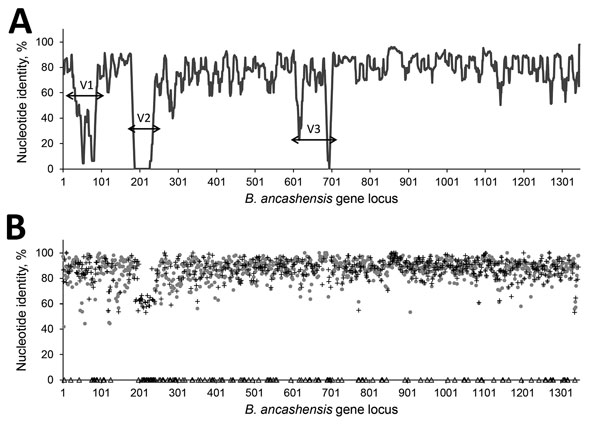Whole-Genome Analysis of Bartonella ancashensis, a Novel Pathogen Causing Verruga Peruana, Rural Ancash Region, Peru
Kristin E. Mullins
12
, Jun Hang
2, Robert J. Clifford
2, Fatma Onmus-Leone, Yu Yang, Ju Jiang, Mariana Leguia, Matthew R. Kasper, Ciro Maguina, Emil P. Lesho, Richard G. Jarman, Allen L. Richards, and David Blazes
Author affiliations: Uniformed Services University of the Health Sciences, Bethesda, Maryland, USA (K.E. Mullins, J. Jiang, A. Richards, D. Blazes); US Naval Medical Research Center, Silver Spring, Maryland, USA (K.E. Mullins, A. Richards); Walter Reed Army Institute of Research, Silver Spring (J. Hang, R.J. Clifford, F. Onmus-Leone, Y. Yang, E.P. Lesho, R.G. Jarman); US Naval Medical Research Unit No. 6, Lima, Peru (M. Leguia, M.R. Kasper); Universidad Peruana Cayetano Heredia, Lima (C. Maguina)
Main Article
Figure 4

Figure 4. Pairwise comparisons of protein-coding genes of Bartonella isolates from patients with verruga peruana, rural Ancash region, Peru. A) Nucleotide similarity of B. ancashensis protein-coding sequences compared with those of B. bacilliformis (gray circles in panel B), top hit non-bacilliformis Bartonella (+ in panel B) and not determined hypothetic proteins (Δ in panel B). B) Nucleotide similarity plot. Average nucleotide identity within a window of 10 genes was plotted against gene locus number. Regions I, II, and III are 3 variable regions that contain genes with lower nucleotide identities or absent in the B. bacilliformis genome. V, variable.
Main Article
Page created: February 17, 2017
Page updated: February 17, 2017
Page reviewed: February 17, 2017
The conclusions, findings, and opinions expressed by authors contributing to this journal do not necessarily reflect the official position of the U.S. Department of Health and Human Services, the Public Health Service, the Centers for Disease Control and Prevention, or the authors' affiliated institutions. Use of trade names is for identification only and does not imply endorsement by any of the groups named above.
